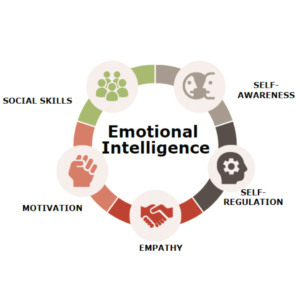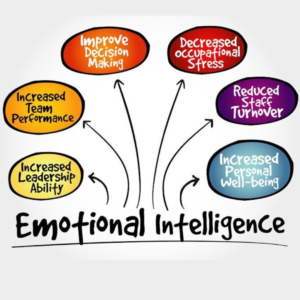Emotional Intelligence (EI) is the ability to recognize and understand emotions in oneself and other, and to use this awareness to guide the thought and behaviour. It is a vital component of personal and professional success, and has been linked to numerous benefits, including better relationships,improved communication, and increased resilience.
What is Emotional Intelligence?
Emotional intelligence is made up of four key components:
1. Self-awareness: The ability to recognize and understand one’s own emotions and how they impact behaviour.
2. Self regulation: The ability to manage and control one’s own emotions, even in challenging situations.
3. Motivation: The ability to use emotions to drive motivation and achieve goals.
4. Empathy: The ability to recognize and understand emotions in others.
Benefits of Emotional Intelligence
Individuals with high emotional intelligence tend to experience a range of benefits, including:
1. Better relationships: Emotional Intelligence helps individuals build stronger, more meaningful relationships by understanding and responding to the emotions of others.
2. Improved communication: Emotional Intelligence enables individuals to communicate more effectively, both verbally and non-verbally, understanding the emotional tone of a message.
3. Increased resilience: Emotional intelligence helps individuals cope with stress, anxiety, and other challenging emotions by providing strategies for managing and regulating emotions.
4. Enhanced decision making: Emotional Intelligence enables individuals to make more informed decisions by considering the emotional impact of their choices.
5. Improved mental health: Individuals with high emotional intelligence tend to experience fewer symptoms of anxiety, depression, and other mental health issues.
In a word, Emotional Intelligence describes ability, capacity, skill, or self-perceived ability to identify, assess, and manage the emotions of one’s self, of others, and of groups. The theory is enjoying considerable support in the literature and has had successful applications in many domains. The intelligence quotient (IQ), is a score derived from one of several different standardized tests to measure intelligence. It has been used to assess giftedness and sometimes underpin recruitment. Many have argued that IQ, or conventional intelligence, is too narrow; some people are academically brilliant yet socially and interpersonally inept. We know that success does not follow those who possess a high IQ rating.
“If your emotional abilities aren’t in hand, if you don’t have self-awarenesss, if you are not able
to manage your distressing emotions, if you can’t have empathy and have effective relationships,
then no matter how smart you are, you are not going to get very far”.
— Daniel Goleman
Wider areas of intelligence enable or dictate how successful we are in toughness, determination and vision help. But emotional intelligence often measured as emotional quotient or EQ is more and more relevant to emportant work-related outcomes such as individual performance, organizational productivity, and developing people because its principles provide a new way to understand and assess the behaviours, management styles, attitudes, interpersonal skills, and potential of people. It is an increasingly important consideration in human resource planning job profiling,recruitment, interviewing and selection, learning and development, and client relations and customer service, among others.
Can Emotional Intelligence Be Learned?
“Nothing great was ever achieved without enthusiasm”.
–Ralph Waldo Emerson
A common question relates to whether people are born with EQ or whether it can be learned. The truth is that some will be more naturally gifted than others but the good news is that emotional intelligence skills can be learned. (This must be so because emotional intelligence is shown to increase with age). However, for this to happen, people must be personally motivated, practice extensively what they learn, receive feedback, and reinforce their new skills.
Promoting Emotional Intelligence in the Workplace
“Comfort in expressing your emotions will allow you to share the best of yourself with others, but not being able to control your emotions will reveal your worth”.
–Bryant H. McGill
The work conducted in most organizations has changed dramatically in the last twenty years. Of course, there are now fewer levels of management and management styles are less autocratic. But there has also been a decided move toward knowledge and team-based, client-oriented jobs, so that individuals generally have more autonomy, even at the lower levels of organizations. Since modern organizations always look to improve performance, they recognize that objective, measurable benefits can be derived from higher emotional intelligence. To name a few, these include increased sales, better recruitment and retention, and more effective leadership.
Naturally, the criteria for success at work are changing too. Staff is now judged by new yardsticks: not just by how smart they are, or by their training and expertise, but also by how well they handle themselves and one another, and that is strongly influenced by personal qualities such as perseverance, self-control, and skill in getting along with others. Increasingly, these new yardsticks are being applied to choose who will be hired and who will not, who will be let go and who will be retained, and who will be past over or promoted.
“I resepect the man who knows distinctly what he wishes. The greater part of all mischief in the world arises from he fact that men do not sufficiently understand their own aims. They have undertaken to build a tower, and spend no more labour on the foundation that would be necessary to erect a hut.”
–Johan Wolfgang Von Goethe
Emotional Intelligence may be the long sought missing link that unites conventional “can do” ability determinants of job performance with “will do” dispositional determinants. Modern organizations now offer learning and development that is explicitly labeled as “Emotional Intelligence” oe “Emotional Competence” training. In support, their leaders create and manage a working environment of flexibility, responsibility, standards, rewards, clarity, and commitment.





Excellent article Smitha
Keep up the good work.
Thank you very much Binsu
Excellent. Well explained.
Thank you very much 🙏
EQ = TEAM
IQ = INDIVIDUAL,
This is was I always felt.. Smita, your article, describes in detail.. Appreciate your skills.. Well done
Thank you very much Robin
Great! Good perspective and well written article! Congratulations!
Thank you very much dear 😊
Very well crafted … Excellent work one should read thisundermmmm and understand it as well